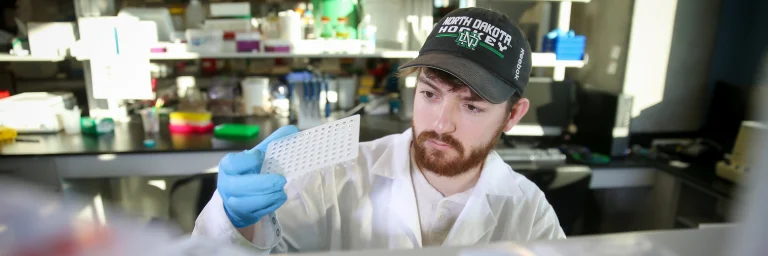Biomedical Engineering Minor
Build your knowledge to help launch the next generation of medical breakthroughs.
Today’s health issues will be solved with tomorrow’s diagnosis, monitoring, surgical and therapy technologies. With a Biomedical Engineering minor, you’ll build a foundation for entering the biomedical device field.
- Program type:
- Minor
- Format:
- On Campus
- Est. time to complete:
- 2-3 years
- Credit hours:
- 27
Why minor in Biomedical Engineering?
From amazing medical technology featured in sci-fi movies, to the futuristic-like devices in today's most advanced hospitals, it will take experts that can fuse engineering and medicine to imagine tomorrow's innovations. Biomedical engineers create life-saving devices that can:
- Create artificial organs
- Automate monitoring of vitals
- Assist in surgeries
- Simulate procedures
- Build medical advancements once considered science fiction
Our program covers biomedical topics in a variety of areas:
- Medical Internet of Things (Medlot)
- Bio-instrumentation
- Biomedical Signal and Image Processing
- Neuroengineering
- Biomedical Imaging
- Bioinformatics
- Biomechanics
- Other emerging biomedical engineering areas
Advance healthcare solutions through engineering by bridging the gap between engineering and medicine. Most importantly, you'll gain the foundation to pursue further education and research to help create new solutions that can help improve the healthcare outcomes of lives all around the world.
What majors pair well with a Biomedical Engineering minor?
Pairing a Biomedical Engineering minor with certain majors can enhance your skill set and broaden your career options in fields such as healthcare, technology, and research. Alternatively, you can deepen your expertise with a bachelor of Biomedical Engineering degree. Here are some bachelor’s degrees that pair well with a Biomedical Engineering minor:
- Biology Degree: Provides a solid foundation in biological principles, complementing biomedical engineering knowledge for roles in biotechnology, medical research, or pharmaceuticals.
- Chemical Engineering Degree: Applies chemical principles to biological processes, beneficial for roles in bioprocess engineering, pharmaceutical manufacturing, or biochemical research.
- Electrical Engineering Degree: Offers expertise in electrical systems and technology, valuable for roles in medical device design, biomedical instrumentation, or healthcare technology.
- Kinesiology Degree: Explores biomechanics and human movement science, enriching understanding in areas such as rehabilitation engineering or sports biomechanics.
- Mechanical Engineering Degree: Delivers insights into advanced material processing and biomaterials, beneficial for careers in medical device development and manufacturing.
Biomedical Engineering Minor at UND
-
Designed to focus on areas where biomedical engineering expertise is most needed.
-
Help develop intellectual property to generate company spin-offs, attract new companies and economic development.
-
Collaborative research with faculty of UND's School of Medicine & Health Sciences, College of Engineering & Mines and NDSU's College of Engineering.
